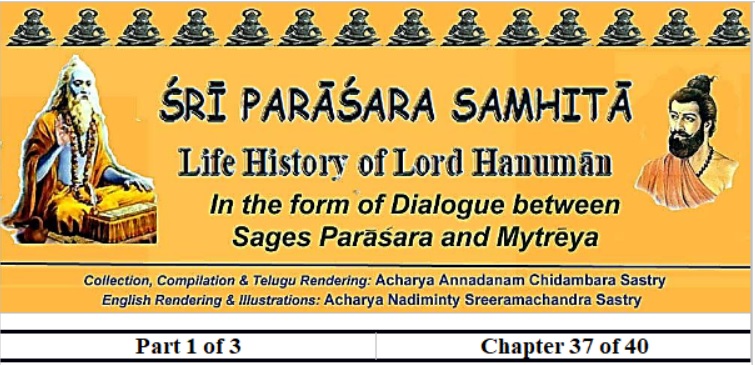
37th Chapter (Saptaaţrinśatpaţalah)
“The Story of the Impact of Mālāmantra”
(Mālāmantra Prabhāva Kathanam)
श्रीमैत्रये :
श्लोक:-
पराशरान्यं हनुमन्मालामन्त्रं महाद्भुतं
वदस्व श्रोतुमिच्छामि सर्वाभीष्टार्थसिद्धये।। 1
Mytrēya:
“Oh! Seer Parāśara! I am interested in listening to another malāmantra of Hanumān. Hence tell me that that fulfills all wishes. (1)
श्रीपराशर:
अगस्त्यसंहितायां तु सुतीक्ष्णाय पुरा मुने!
उदीरितमगस्त्येन तद्वदामि त्रूणुष्व तत्।। 2
Seer Parāśara:
Agastya – Sutīkşņa Dialogue
Oh! Great sage Mytrēya! Long back, this was narrated by seer Agastya to Sutīkşņa in the Agastya Samhitā. I am narrating that. Listen. (2)
सुतीक्ष्ण:
सर्वज्ञ! सर्वदेवार्थतत्त्वज्ञानसुनिश्चल!
सम्यक्संशिक्षित: ते हं बहुधापि कृपाम्बुधे!
त्वया कारुण्यनिधिना पूर्वमज्ञस्तथा जड:।। 3
Sutīkşņa said, ‘Oh! All-knowing seer Agastya! One with a balanced mind due to knowing the nature of all the gods! One full of mercy! I was enlightened, thanks to your tutoring me in several ways. Before that, I was knowledgeless and also senseless (cētanarahita). (3)
त्वत्प्रसादेन संजातज्ञानो स्मि गतकल्मष:।। 4
Thanks to your benevolence, I got rid of my sins and became a knowledge full person. (4)
रामात्मनि परे ब्रह्मण्यासक्तं मानसं मम
लक्ष्मणे पि यथा रामे किव्म्चद्वेदो स्ति नैव हि।। 5
My heart settled on the Supreme Being (Parabrahma) named Rāma. Similarly, without any difference, I was attracted towards Lakşmaņa as much as towards Rāma. (5)
हनूमन्मन्त्र इत्युक्त: त्वया वै मुनिपुड्गव
सत्यानुष्ठानमखिलं ज्ञातुमिच्छास्ति मे प्रभो!
मयि प्रपन्ने सकलमाचक्ष्वाशु दयानिधे! 6
Oh! Best amongst sages! The Hanumanmantra was explained by you. I have a desire to know the entire procedure of performing that. Oh! Merciful one! One capable of doing everything! Please be kind to me and tell me the all about it’. (6)
अगस्त्य:
स्मारितस्सम्यगेवाहं त्वया श्रद्धावता मुने!
आव्म्जनेयमनुर्लोके भुक्तिमुक्त्त्येकसाधनम्
प्रकाशितं शड्करेण लोकानां हितमिच्छता।। 7
Agastya said, ‘Oh! Sutīkşņa! I was thought about by you with utmost devotion. The only means of getting this world’s good things (bhukti) as well as libaration (mukti) from it is the mantra of Lord Hanumān. This mantra was revealed by Śiva, the benefactor of the world. (7)
भूतप्रेतपिशाचादिशाकिनीब्रह्मराक्षसा:
दृष्ट्वैव प्रपलायन्ते मन्त्रानुष्ठानतत्परम्।। 8
Ghosts, spirits, wandering spirits amd others (bhootaprētapiśācadi), śākinī frmale demons and great supreme demons (brahmarāksaśī) will run away from one that recites this Hanumān mantra. (8)
ऋषिरीश्वर एवास्य अनुष्टुप्छन्द इष्यते
हनुमान् देवता प्रोक्त: क्रीं बीजं शक्ति: ह्रीं तथा।। 9
Hanumanmālā Mantra
It was told that for this mantra, Śiva himself is the sage (ŗşi), anuşţup is the metre (chandas), Hanumān is the Lord (dēvata), ‘krōm’ is the power (śakti). (9)
कीलकं हत्रयं प्रोक्तं पदकं तु हसौ पुन:
हनूमत्प्रीणनं चैव फलमाद्यमुदीरितम्।। 10
Three times ‘ha’, that is, ‘hum hum hum’ (‘u’ to be like that in ‘but’), is considered to be the key (keelakam); all recited as rows of verse. The kindness of Hanuman is said to be the fruit (phala) or result. Hence – ‘Hanumatprasāda siddhayarthē japē viniyōgah’ (= The recitation is for attaining Hanumān’s benefaction) (10)
सर्वेप्सितानां दातृत्वमस्यैवास्ति न चान्यत:
प्रभावेनास्य बहव: सिद्धिमापुस्तपोधन! 11
Only this mantra fulfills all the wishes. Oh! One rich in the power of sacrifices! Many attained success of actions by the effect of this. (11)
मन्त्रोद्धारं प्रवक्ष्यामि त्रूणुष्वानन्यमानस:
मायामादौ प्रविन्यस्य ओं नमो हनुमत्पदम्।। 12
Raising the Mālāmantra
I am telling the method of raising this mantra. Listen attentively. After performing nyāsa (body touching), saying the words ‘Ōmm namō Hanūmatē’ (12)
तत्तत्प्रकटसंयुक्तपराक्रमपदं तथा
तदाक्रांतपदोपेतदिड्मण्डलमुदीरयेत्।। 13
Then saying the words ‘prakata samyukta parākrama’ and then ‘ākrānta dińgmandaļa’, i.e., ‘prakatasamyukta parākramākrānta dińgmandaļāya’ (= For the One with comprehensively expressed valour that covers all the directions). (13)
यशोवितानधवलीकृतजगत्त्रितयाय च
वज्रदेहेति रुद्रेति अवतारपदं तथा।। 14
(Then) to be said, ‘yaśōvitāna dhavaļeekŗta jagatritayāya’ and then ‘vajradēhāya rudrāvatārāya’ (= For the One who paled the Three Worlds with spread of his immense greatness, for the one with diamond strong body, for the very Form of Rudra, the fierce form of Śiva). (14)
संबुध्यंतं तथा लंकापुरीदाहेन ईरयेत्
उदधेर्बंधनं चापि दशशीर्षपदं तथा
कृतांतकपदं चोक्त्वा सीतासमाश्वासनपदम्।। 15
Then, by way of addressing, the words to be said are – ‘Lankāpurī dāhaka! (One that burnt down the city of Lanka), udadhinandhaka! (One that crossed the sea), daśaśīrşakŗutāntaka!’ (One that is instrumental in killing of the Ten-Headed Rāvaņa) and ‘Sītāsamāśvāsaka’ (One that gave gurantee of safety to Sītā); (15)
अव्म्जनागर्भसम्भूतरामलक्ष्मणपदं तथा
आनन्दकरं पश्चात् कपिसैन्यपदं तथा।। 16
‘Ańjanāgarbha sambhoota!’ (One born to mother Ańjana), then to be said ‘Rāmalakşmaņānandakara!’ (Giver of happiness to Rāma and Lakşmaņa), then the words ‘kapisainya (16)
‘प्राकार’ पदमुच्चार्य सुग्रीवपदमुच्चरेत्
सन्धानपदमुच्चार्य पर्वतोत्पाटनं पदम्।। 17
Prākara!’ (One that is the protection wall for the monkey army), then ‘Sugrīvasandhāta!’ (One that affected coming-together of Sugrīva and Rāma), then ‘parvatōtpāţaka!’ (One who lifted the mountain – Sanjeevani) to be said (in that order). (17)
बालब्रह्मचारिन्निति गम्भीरशब्दपदं तथा
सर्वग्रहनाशनेति सर्वज्वरोच्चाटनं तथा।। 18
Then ‘bālabrahmacārin!’(celibate child!, then ‘gambheeraśabda!’ (One with a deep resonant voice), then ‘sarvagrahanāśana!’ (destroyer of all ill-omened planets) and ‘sarvajvarōcchśtana!’ (Remover of all types of fevers), (18)
ढाकिनीविध्वंसिनी पदं ततस्तारमुदीरयेत्
मायाहत्रयमुच्चार्य हसौ देहि वदेत्तत:।। 19
Then to be said ‘dākinī vidhvansana’ (destroyer of female demons), then ‘hrām’, ‘hum hum hum’ (‘u’ like in but), ‘hreem’ and ‘hroum’. (19)
सर्वविषपदं चोक्त्वा हरहरेति पदं तथा
परबलक्षोभयद्वन्द्वं ममेति पदमुच्चरेत्
सर्वकार्याणि पदं चोक्त्वा साधयेति द्विरुच्यते।। 20
Then saying ‘sarvavişam hara hara’ (eliminate all poisons) and ‘parabalam kşōbhaya kşōbhaya’ (extinguish strength of others), then the word ‘mama’ (my), then ‘sarvakārayāņi’(all the works), ‘sādhaya sādhaya’ (achieve achieve). (20)
हुं फट् स्वाहेति मन्त्रो यं मालाख्य: सर्वकामधुक्
भगवते चाव्म्जनेयाय अंगुष्ठाभ्यां समन्तत:।। 21
Hand Gesticulations (Karanyāsa)
(Concluding with) ‘hum phat swāhā’ (‘u’ like ‘o’ in English ‘do’) – this mantra is capable of fulfilling all the wishes. Then perform the hand gesticulations (karanyāsa) starting from – ‘Ōmm namō bhagavatē Ańjanēyāya – ańguşţhabhyām namah’ (= Cosmic saluations, for the almighty Hanumān – reverential bow with the thumbs) and others. (21)
रुद्रमूर्तये इत्येवं तर्जनी।
वायुसुतायेति मध्यमा।
अग्निगर्भायानामिका।
रामदूताय कनिष्ठिका।
ब्रह्मास्त्रनिवारणाय।
अस्त्रमन्त्रमुदीरितम्।। 22
‘Ōmm Rudramoortayē – tarjanībhāyam namah’ (= Cosmic saluations, for Rudra, the fierce form of Śiva – reverential bow with the index fingers). ‘Ōmm Vāyusutāya – madhyamābhāyam namah’ (= Cosmic saluations, for Son of Wind God – reverential bow with the middle fingers). ‘Ōmm agnigarbhāya – anamikābhāyam namah’ (= Cosmic saluations, for Son of Fire God – reverential bow with the ring fingers). ‘Ōmm Ramadootāya – kaniştţkābhāyam namah’ (= Cosmic saluations, for the emissaty of Rama – reverential bow with the little fingers). ‘Ōmm Brahmāstra nivāraņāya – karatalakarapŗşţhabhāyam namah’ (= Cosmic saluations, for the neutraliser of of the great Brahma missile – reverential bow with the fronts and backs of the palms). (22)
प्रणवादिनमश्शब्दं षडड्डगानि समुच्चरेत्
एवं षडड्ग्ं च मुखे कृत्वा ध्यायेदनन्यधी:।। 23
After starting with the sacred cosmic syllable ‘Ōmm’ and concluding with the body touchings (ańganyāsa) while uttering the names of the six principle body parts (şdańga), meditation (dhyāna) has to be performed with single-minded concentration. (23)
ध्यानम्
स्फटिकाभं स्वर्णकांतिं द्विभुजाभ्यां कृतांजलिम्
कुण्डलद्वयसंशोभिमुखाम्भोजमहं भजे।। 24
Mantra Procedure
Dhyāna: ‘I am serving the lotus-face that is like quartz, golden-hued and brightly shining with two ear rings, with folded hands (ańjali). (24)
अयुतं तु पुरश्चर्या रामस्याग्रे शिवस्य वा
पूजां तु वैष्णवे पीठे शैवे वा विदधीत वै।। 25
Repetitions for this mantra are 10,000. It is stipulated that worship of Hanumān shoud be done in the Seat of Vişņu, Seat of Śiva, in the august presence of (the idols of), Rama or Śiva. (25)
दशांशं तर्पणं होमं भोजनं च प्रकीर्तितं
संस्कारेण विना दीपो मन्त्रस्यास्य न जायते।। 26
It is stipulated that recitatation routine of this mantra has to include 1/10th tarpaņa (water oblations) 1/10th, hōma (fire sacrifice) and 1/10th annaśānti (offer of food). (26)
आवृत्तिभिर्विना नित्यं निष्फलं विजितेन्द्रिय!
क्षुद्ररोगनिवृत्यर्थं अष्टोत्तरशतं मुने।। 27
Without performing it daily. the mantra routine will be fruitless. Oh! Great Sage! For freedom from stomch ailments, the repititions have to be done 108 times (27)
जप्त्वा त्रिदिनमेकान्ते तेभ्यो मुच्येत तत्क्षणात्
क्षुद्रभूतप्रशांत्यर्थं शतमष्टोत्तरं पुन:
दिनत्रयमतो जप्त्वा भूतानां मुच्यते भयात्।। 28
If routine recitation is carried out alone for three days,one will be free from evil maladies (kşudrarōga) right away. For peace from evil spirits (kşudrabhoota), it was advised to be recited again for 108 times. Thus doing so will make one free from fear of all spirits. (28)
भूतप्रेतपिशाचादिशान्तये ष्टोत्तरं शतं
जप्त्वैव तस्मयान्मुक्तो भवत्येव न संशय:।। 29
It has to be recited 108 times for peace from all spirits, death-spirits and wandering spirits and others (bhootaprētapiśācādi). Doing so will, undoubtedly, drive away fears of all spirits. (29)
महारोगादिशान्त्यर्थं अष्टोत्तरसहस्रकं
जप्त्वा तस्मात्प्रमुच्येत नियतो नियताशन:।। 30
For getting rid of dangerous diseases one has to recite it 1008 times. If done with discipline, even on a limited diet, one will be protected from dangerous diseases. (30)
जयादिकांक्षिणां राज्ञां यस्मादन्यो न विद्यते
ध्यायेद्दुष्टस्य हन्तारं अयुतं च मिताशन:।। 31
A king desirous of victory over killing evil -intentioned enemies, has to recite this mantra for 10,000 time on restricted diet. (31)
जपन्नयुतमांश्चैव जयेद्दुर्जयमस्य किं
सन्धानार्थं तु सुग्रीवसन्धातारं स्मरन् ह्र्दि
अयुतेनैव बलिना सन्धिमाप्नोत्यसंशय:।। 32
There is no doubt in saying that even unconqourable things can also be conquered by reciting 10,000 times. Meditating on Hanumān that brought amicable alliance between Rama and Sugriva and reciting 10,000 times, will allow a King develop amicable alliances even with most powerful ones. (32)
शत्रुराष्ट्रं दहेद्देवदुस्साध्यमपि चानघ!
जयार्थे शत्रुसंधानमस्मादन्यो न विद्यते।। 33
Oh! One free of sins! If recited 10,000 times, meditating on that Hanumān that burnt down the whole Lanka city, one can burn the kingdoms of enemies that are not possible for even the gods. There is no other mantra as effective as this one for those desirous of eliminating enemies. (33)
यस्तु गेहे हनूमंतं सर्वदेवान्प्रपूजयेत्
तद्गृहे तस्य मन्त्रेण तस्य लक्ष्मीरचव्म्चला।। 34
Whoever worships Hanumān and others using this mantra, wealth (Lakşmi) will remain seated in that house. (34)
दीर्घमायुर्लभेदेवं सर्वतो विजयी भवेत्
मायादिभूतसंक्षोभं तद्देशेनैव जायते।। 35
Such a person will get long lfe. He will win every where. In the land of one reciting this mantra, there will never be the fear of spirits. (35)
शत्रवस्सर्वदा मित्रभावेनैवासते परं
शैवानां वैष्णवानां च षट्कर्माध्युक्तचेतसाम्।। 36
Mantra Impact
All enemies will be favourably disposed towards suc a person. For Śaivites, Viaşņavites and all those mentioned seven action-paths (şaţkarma) there is no better worship than reciting of this Hanumanmantra. (36)
चौरव्याघ्रादिभूतानां अयमेव परायणं
परापह्र्तराज्यानां धर्षितानां परै: पुन:
सन्नाहभाजां युद्धेषु योद्धानां परसैनिकै:।। 37
This mantra is the only recourse to those fearing from thieves, tigers and others; and to those who lost their kingdom to enemies or threatened by them. This mantra is the security to those preparing for the war or in the middle of war with enemy troupes. (37)
यात्राकाले हनूमंतं स्मरन् यस्तु स्वकाद्गृहात्
निर्गच्छति स वै सद्य: स्वेष्टार्थमधिगच्छति
स्वापकाले पठेन्नित्यं चौरभूतानि वारयेत्।। 38
One’s desire will be fulfilled (one reaching the destination), if starts from home quietly reciting Hanumān’s names. If recited regularly while sleeping, thieves, spitits and others will be restrained. (38)
कुण्डिनं नाम नगरं श्रीभद्रं कुशतर्पणं
पम्पातीरं चन्द्रकोणं काम्भोजं गन्धमादनम्।। 39
Cities named Kundina, Srībhadra, Kuśatarpaņa, Pampāteera, Candrakōņa, Kāmbhōja,, Gandhamādana, (39)
सुन्दरीनगरं चैव बार्हस्पत्यपुरं तथा
माहिष्मतीपुरं चैव नैमिषारण्यमेव च।। 40
Brahmāvartapura, Bārhnpatyapura, Māhişmatīpura and Naimiśāraņya, (40)
सुन्दरीनगरं चैव रम्यं श्रीहनुमत्पुरं
एतानि हनुमद्रक्तपुण्यस्थानानि नित्यश:
स्मरेत्प्रातरुत्थाय भुक्तिं मुक्तिं च विन्दति।। 41
Sundarīnagara and the beautiful Śrī Hanumatpura are the pilgrimage places for Hanumān devotees. Those who reminisce them soon after waking up in the morning will be well in this world (bhukti)m as well as having liberation (mukti) from it later. (41)
इति श्रीपराशरसंहितायां श्रीपराशरमैत्रेयसंवादे श्रीहनुमन्मालामन्त्रप्रभावकथनं नाम सप्तत्रिंशत्पटल:
Thus ends the 37th Chapter (Saptatrinśatpaţalah) “The Story of the Impact of Mālāmantra” (Mālāmantra prabhāva kathanam) of Śrī Parāśara Samhitā
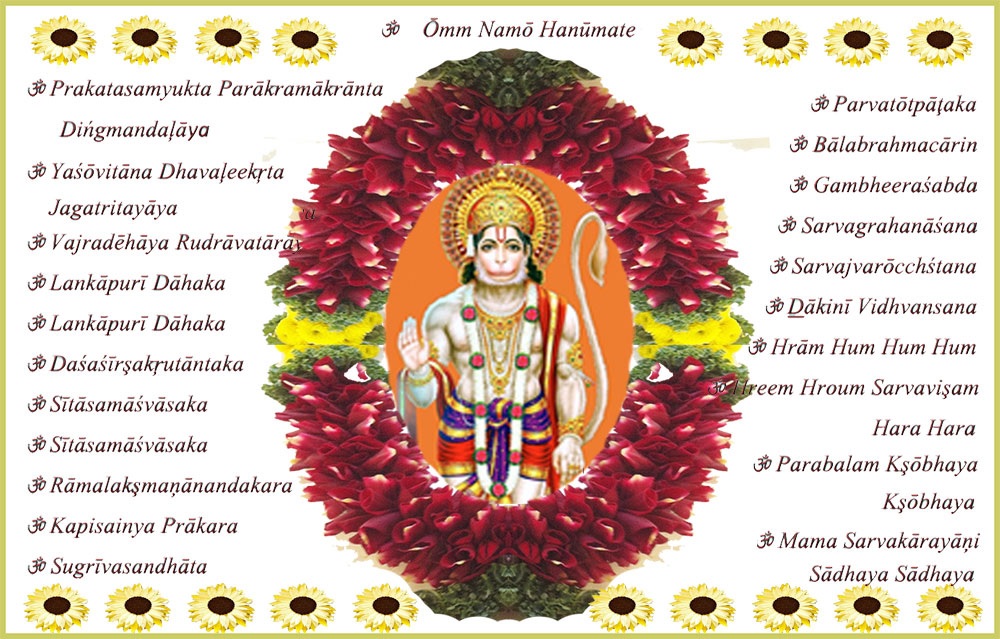
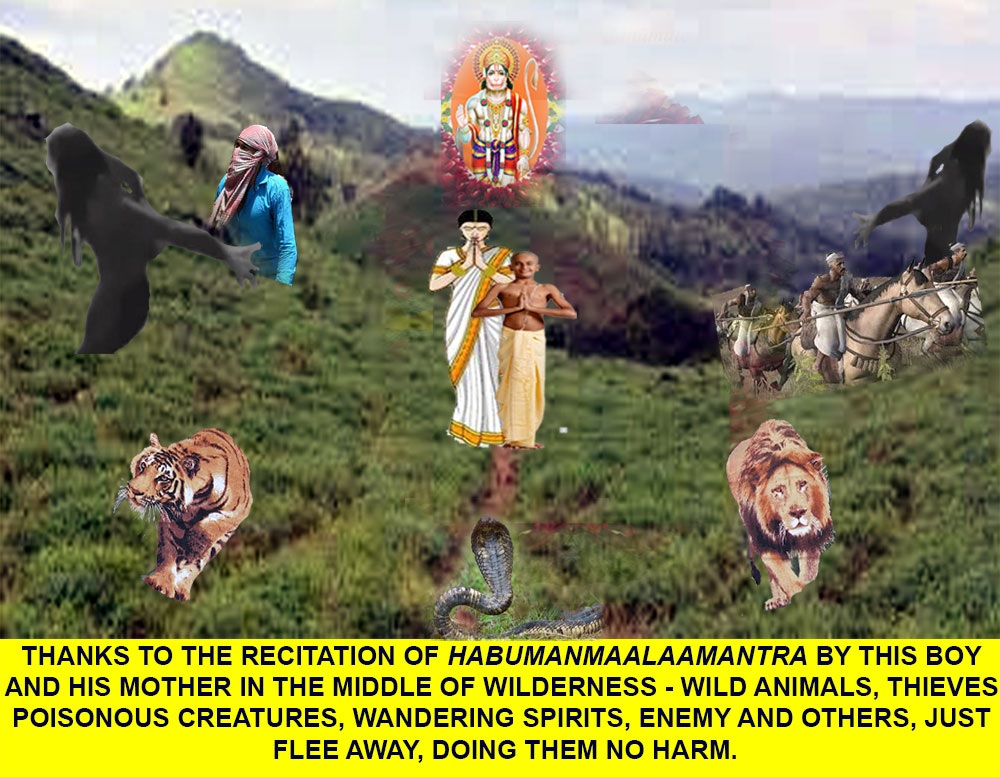
![]()

Click here to visit the Contents of the Part 1.
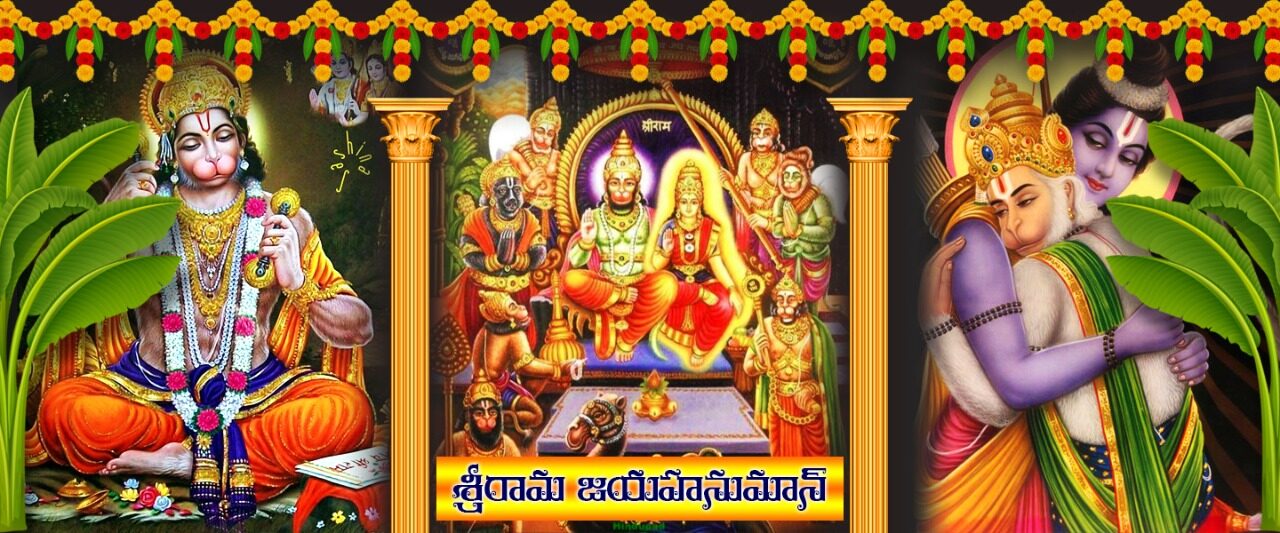
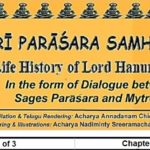

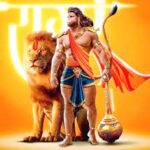
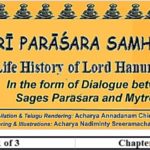

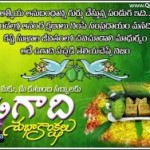
Be First to Comment